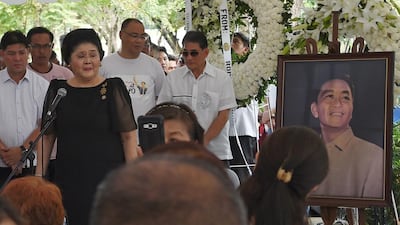MANILA // Family members and followers of Philippine dictator Ferdinand Marcos gathered for a vigil at his tomb on Saturday, a day after his secrecy-shrouded burial at the country’s Heroes’ Cemetery triggered widespread protests.
Marcos’s widow Imelda thanked supporters and local officials who travelled by bus from the family’s northern home province to pay their respects. She said they had given her family strength as they kept the hope for nearly 30 years to have him buried at the national cemetery, which is reserved for former presidents, national artists and soldiers.
Thousands of pro-democracy activists who rallied in Manila on Friday said they were planning more protests in the days and weeks ahead.
President Rodrigo Duterte, who has backed Marcos’s burial, saying it was his right as a president and soldier, appealed for calm.
“Hopefully both sides will exercise maximum tolerance and come to terms with the burial,” said a spokesman for the president, who is attending an Asia-Pacific summit in Peru.
“I know Ferdinand will at last be at rest here at the Heroes’ Cemetery,” Mrs Marcos said in front of a black tomb surrounded by wreaths of white flowers. “But I know we still have a lot of criticisms to face.”
Her daughter, Ilocos Norte governor Imee Marcos, and son Ferdinand “Bongbong” Marcos Jr, a senator, also thanked supporters and apologised for keeping the burial secret. Mr Marcos said there were reports that anti-Marcos groups would create trouble.
The burial threatens to open old wounds in the Philippines, where Marcos is accused of massive human rights violations and corruption under martial law that he imposed on the country for half of his 20-year rule. He was ousted in “people power” street protests in 1986 that sent him and his family into exile in Hawaii, where he died three years later.
The powerful Marcos family has repeatedly denied any wrongdoing and after returning from US exile in 1991, Mrs Marcos and two of her children eventually ran for public office and made stunning political comebacks.
In 1993, Marcos’s body was taken to his hometown in Ilocos Norte, where it was displayed in a glass coffin and became a tourist attraction. But his family fought for his remains to be transferred to the Heroes’ Cemetery.
* Associated Press

